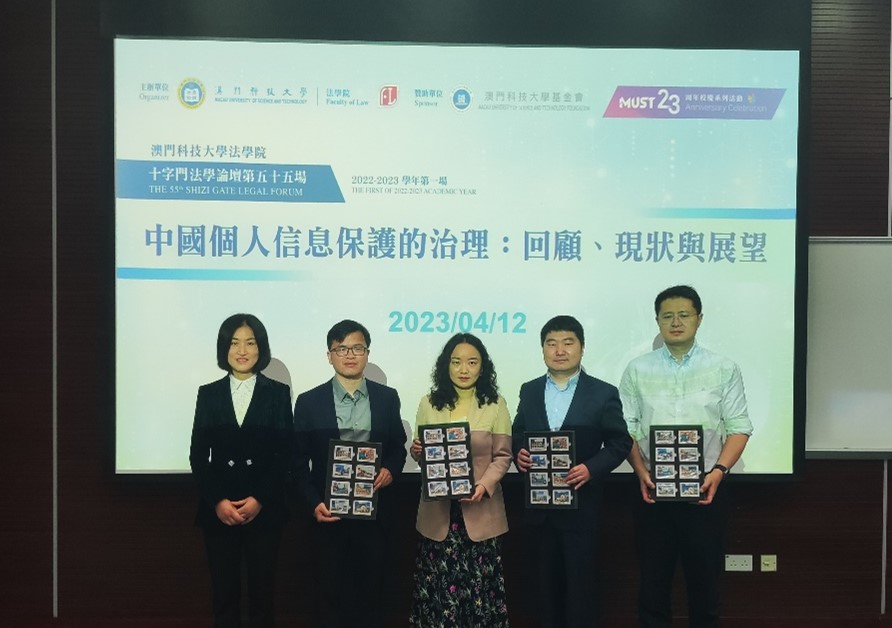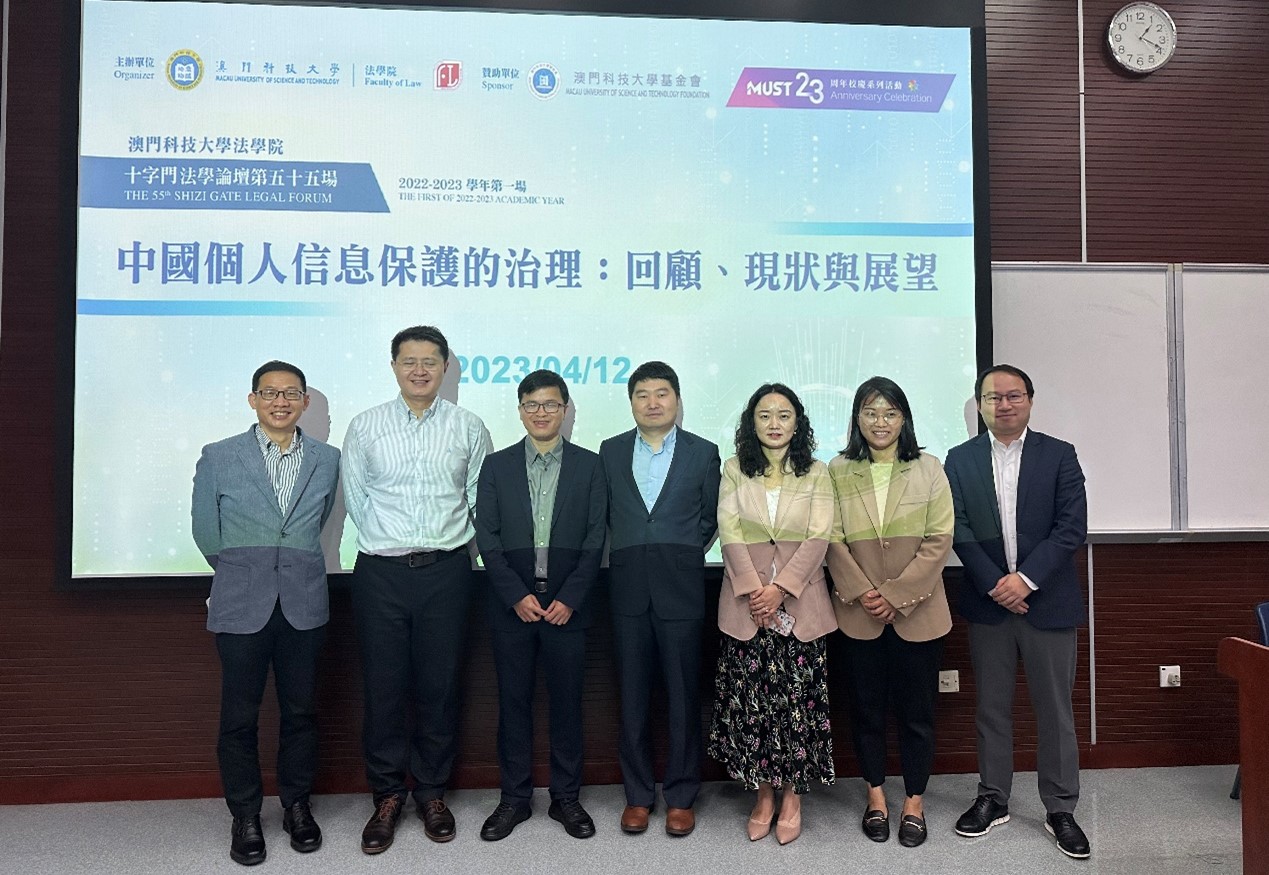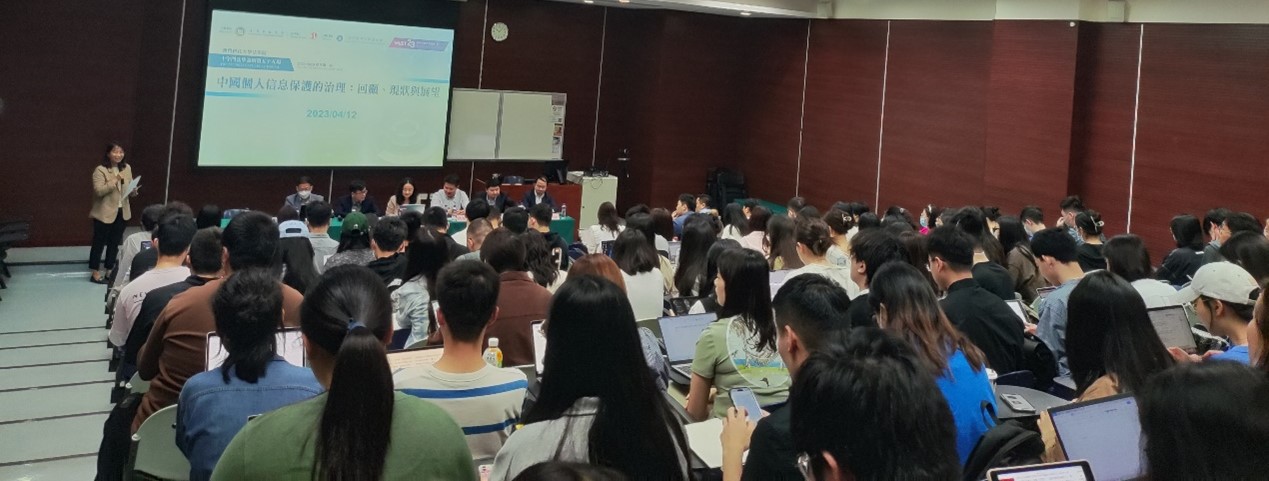On the morning of April 12, 2023, the 55th session of the Law Forum of the Faculty of Law at the University of Science and Technology of Macau (USTM) (the first session of the 2022-2023 academic year) was successfully held at Lecture Hall N316 on campus. The event was organized by the Faculty of Law, M.U.S.T., and sponsored by the M.U.S.T. Foundation. The theme of this forum was "Governance of Personal Information Protection in China: Review, Current Status, and Prospects."
The forum had the honor of inviting Associate Professor Xu Ke, Director of the Center for Digital Economy and Legal Innovation at the University of International Business and Economics, Associate Professor Guo Bing, Deputy Dean of the Institute of Data Rule of Law at Zhejiang Sci-Tech University, Professor Hong Yanqing from the School of Law at Beijing Institute of Technology, and Professor Feng Zixuan, Executive Director of the Institute of Digital Rule of Law in Government and Vice Dean of the School of Artificial Intelligence Law at Southwest University of Political Science and Law, as guest speakers. Assistant Professors Xie Gengliang and Zhou Qin from the Faculty of Law, M.U.S.T., served as panelists, and Assistant Professor Xiao Huina served as the moderator of the forum. More than one hundred students attended the forum in person.

Presentation of Commemorative Gifts
(From left to right: Professor Fang Quan, Associate Professor Guo Bing, Professor Feng Zixuan, Associate Professor Xu Ke, Professor Hong Yanqing)
At the beginning of the forum, Professor Fang Quan, Dean of the Law School, presented commemorative gifts to the attending guests and took a group photo. During the forum, Associate Professor Xu Ke introduced four international balancing mechanisms based on proportionality, risk, scenarios, and markets. He pointed out that China's Personal Information Protection Law establishes three international balancing mechanisms based on proportionality, risk, and scenarios, but lacks a market-based balancing mechanism. However, China has a trust-based balancing mechanism that other countries do not have, which includes enriching the obligations of personal information processors, restricting the rights of personal information subjects, and balancing the interests of all parties involved in personal information processing.
Associate Professor Guo Bing gave a presentation titled "Personal Information Protection through Judicial Means: From Private Litigation to Public Interest Litigation." He pointed out that although judicial remedies are not the best means to protect personal information in China, they serve as the last resort. Due to difficulties in filing lawsuits, winning cases, obtaining compensation, and enforcing judgments in private litigation, public interest litigation in the field of personal information protection led by the procuratorial organs has emerged.
Associate Professor Guo Bing was the plaintiff in the first national facial recognition case, and he urged students to use the weapon of law to protect their personal information and promote legal progress. Professor Hong Yanqing presented on "The Standard System and Enforcement Practices of Personal Information Protection," based on her rich practical and theoretical experience. She outlined the enforcement agencies and standard systems for personal information protection and elaborated on the enforcement areas, focus, and effectiveness of China's personal information protection enforcement agencies based on the standard system. She highlighted typical illegal behaviors discovered during enforcement, including undisclosed collection and use rules, collection of personal information without user consent, and collection of personal information unrelated to the provided services. She concluded that China's current enforcement scenarios for personal information protection exhibit diverse and detailed characteristics.
Professor Feng Zixuan gave a presentation titled "Balancing Open Government Data and Personal Information Protection." She introduced the legal framework for open government data and personal information protection, and highlighted the dilemmas and challenges in personal information protection in the context of open government data, such as limited informed consent rights, inadequate implementation of privacy protection measures, difficulties in seeking remedies for personal information infringements, and increased depth and breadth of privacy breaches due to technological attacks. She advocated for adopting a "scenario-based interest balancing" theory to improve mechanisms for information subject participation, establish a sound privacy protection mechanism through collaborative governance, and refine privacy impact assessments and risk response mechanisms.
Assistant Professor Xie Gengliang, the Program Director, and Assistant Professor Zhou Qin provided insightful comments on the presentations of the four keynote speakers, elevating the academic atmosphere of the forum.

Guests' Group Photo
(From left to right: Xie Gengliang, Program Director; Hong Yanqing, Professor; Guo Bing, Associate Professor; Xu Ke, Associate Professor; Feng Zixuan, Professor; Xiao Huina, Assistant Professor; Zhou Qin, Assistant Professor)
The "Shizi Gate Law Forum" brought together scholars who covered a wide range of topics, including the value balance of personal information protection, judiciary, law enforcement, and government power constraints. The forum was rich in content and presented novel perspectives, expanding the theoretical and practical horizons of the Law School students. It also provided new insights into the current state, issues, and future of personal information protection in China. During the interactive session, the attending guests responded to questions from the students in the audience. The forum lasted for over three hours, with enthusiastic participation from both faculty and students. It concluded successfully in a vibrant academic atmosphere.

